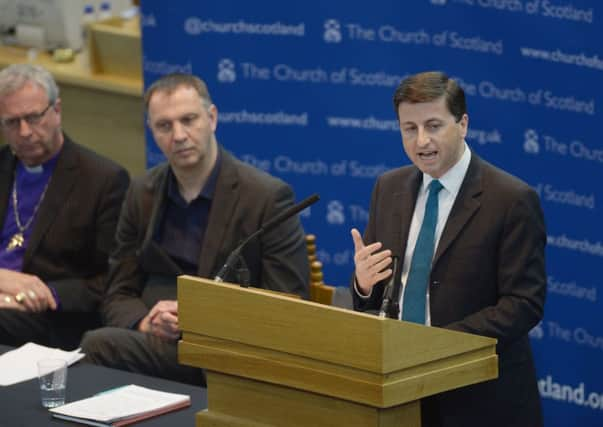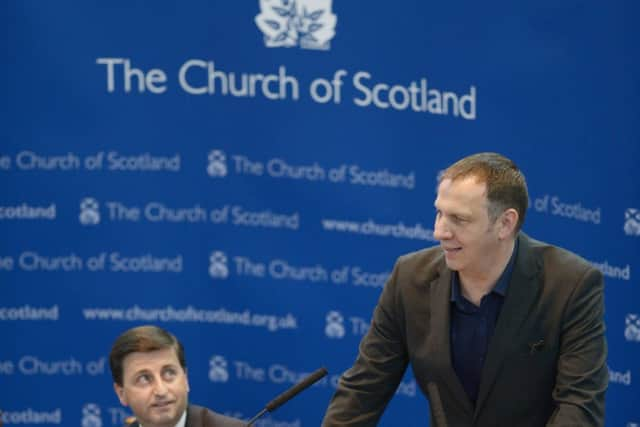As it happened: Kirk debate on independence


4.50pm: Taking his turn to speak, the Rev Doug Gay said he wanted the Kirk to “find our voices in this debate. Firstly, because we too are Scotland – in the recent census, more Scots individually identified in some way with the Church of Scotland than with any other single body in Scottish life. Secondly, because a liberal democracy benefits from the contribution of organized groups and associations.”
He added that the sheer number of people the various faiths combined represent meant “our voices and our voice matters”.
Advertisement
Hide AdAdvertisement
Hide Ad“We owe one another a basic respect and recognition in relation to our cultural differences – God has no favourites – Edinburgh, I’m afraid is no closer to heaven than Belfast, Dublin, Cardiff or Manchester.


He insisted that he had “no truck with narrow nationalism”. He said: “The nationalism I espouse and the one which is to the fore in Scotland at the moment is a generous, hospitable, liberal civic nationalism – a broad, not a narrow nationalism. One which welcomes new Scots who settle here and welcomes those of many nationalities who come to Scotland for a season.”
Said that the nationalism he identified with was one that wanted to enter a “warm and respectful social union with England and Wales and Northern Ireland – to be open to a constructive currency union, to maintain a co-operative union with Europe and the commonwealth – one which wants to take its place as an equal partner in the family of nations.”
Mr Gay said that Christians who identified as nationalists could not base their beliefs on on “belligerence or superiority or ethnic exclusivism”. He said: “No Christian can ever say my country right or wrong. We place our political allegiances under the sovereignty of God and the Lordship of Jesus Christ.”
He said that there will be many who would vote Yes in September who are not nationalists but are pro-independence. He insisted that the campaign was not “the Salmond campaign or the SNP campaign” but a “cross-party and civil society campaign for political self-determination”.
Believed that a Yes vote would “secure an exciting opportunity to develop an ongoing ‘journey of reform’ for Scotland.”
Acknowledged that independence would not bring a “utopia” and that it represented a “future full of risks and challenges and uncertainties”. But he insisted that so did the future within the union, stating that that the “negativity and fear-mongering of the NO campaign at its worst, has I think been so counter-productive”.
“What degrades political discourse is when in order to win an argument or an advantage – we apply tests to our opponents claims which we know our own could never meet.
Advertisement
Hide AdAdvertisement
Hide Ad“We never get to control the future, only some of our own responses to it. A lot of political choices like a lot of spiritual ones, depend on faith.”
“I want to see a more equal Scotland, a more compassionate and hospitable Scotland. A Scotland which rejects the use of or the threat to use weapons of mass destruction.”
Mr Gay said that though he had many family connections with England, he wanted to see a “Scotland which asserts itself appropriately against a painfully anglo-centric and London-centric media” and assert its cultural identity.
Insisted that he was not a “fundamentalist nationalist”: “I want to vote YES and leave the parliamentary union because I do not believe the UK as it stands is capable of making the journey of reform it so badly needs to make” in relation to electoral and economic reform.
Referencing former prime minister Tony Blair’s quote, he said: “The hand of history is upon our shoulders. We have, yes, a historic opportunity this year to set out on a new journey of reform. As Christians we are called to a sober realism and a demanding vocation – for me, taken together, they point to a Yes.”
4.45pm: Mr Alexander said that the referendum represented “an opportunity to reaffirm the common endeavour of sharing risks, resources and rewards across these islands and to uphold the ethic and the practice of neighbourliness – being our brother and sister’s keeper.”
He said that “the practice of solidarity is what most challenges the notion that somehow Scotland needs independence because Scots are better at being fair than the English, or at least, we’d be better at it if the English weren’t around.”
“The break-up of the United Kingdom would represent a defeat for progressive ideals and a retreat from a shared vision of a multi-ethnic, multi-cultural, multi-national state.
Advertisement
Hide AdAdvertisement
Hide Ad“The future I believe will belong to those who build networks of cooperation, because they understand, because they feel, that while our differences do matter, our common humanity matters more.”
Quotes historian Simon Schama he said that UK’s success was because of the plurality of peoples, languages and customs, rather than a “tribal singularity”.
He said he believed the UK “embodies a quintessentially modern idea – that this coming together of neighbours, families, friends, ideas, institutions and identities is broadening, not narrowing, and is a strength and not a weakness for 21st century Scotland.”
He added that vote for the Union was vote for a “principled and pragmatic solidarity that shares risks, rewards and resources across these islands.” and to “sustain the deep connection expressed in our political, economic and social ties with our neighbours across the partnership, the family, the United Kingdom.”
4.40pm: Addressing the referendum, Mr Alexander said: “Whether to remain part of the UK or walk away from our neighbours is an individual choice for each voter in Scotland but it is also a decision about the nation we are and the better nation we want to become.”
Acknowledging the degree integration between the Scottish economy and the rest of the UK, the debate, he said, would inevitably lead to “serious economic questions” being asked, but he said had to involved “more than accountancy”: “It will involve deep and profound discussions about our identity and our ideals, about neighbourliness and community in the 21st century.”
Noting that the Assembly Hall was where the first meeting of the Scottish Parliament in 300 years was held in 1999, Mr Alexander said that it had returned the country’s “distinctive institutions to the direct accountability of its people”, and “eliminated Scotland’s democratic deficit.”: “We have a strong Scottish Parliament and more powers are on the way.”
“Given that historic change it cannot be argued seriously any longer that Scotland’s culture, its distinctive institutions, or its nationhood are today threatened by the partnership that is the United Kingdom.”
Advertisement
Hide AdAdvertisement
Hide Ad4.38pm: Having drawn lots, Douglas Alexander speaks first for the Union. He said the fact that the event was “not a debate but a respectful conversation is, in itself, a reflection of the Kirk’s contribution to the shaping of Scotland; reminding us that we are at our best when we focus on what connects us, not what divides us.”
Mr Alexander spoke of his sense of connectedness with the gathering. He said that his father, who was present, and his grandfather were both parish ministers, while his mother’s parents had served as Church of Scotland medical missionaries in Manchuria.
He added: “But my connectedness with this place is more than my ancestry; for I come here today not so much as a politician as a parishioner.
“For so many of us family and past may bring us here. Faith holds us here.
“That is a perilous statement from a politician. I am instinctively wary of religious certainty expressing itself in politics.”
He added: “Christianity for me is a call to a relationship that challenges and changes all our other relationships,” adding that “to love our neighbour is an ethic; a covenant, that has transformed history and is the foundation of my remarks today.”
SEE ALSO